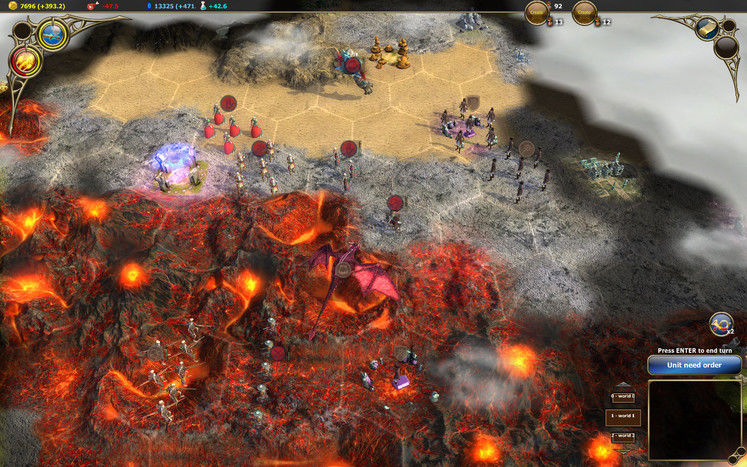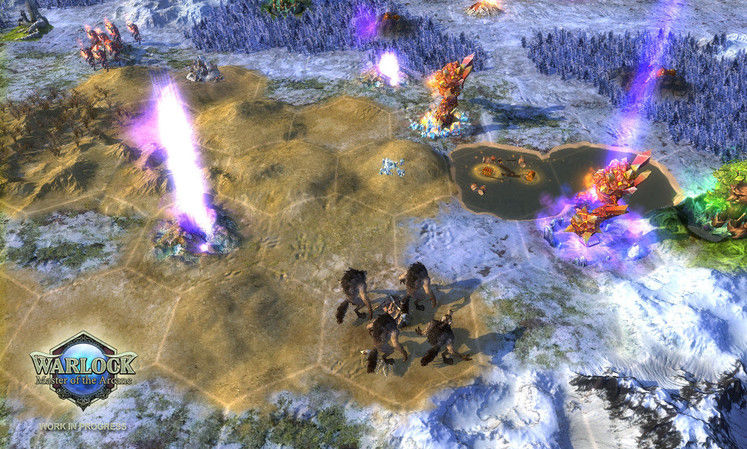In a way, Warlock is a very confusing game. It's vibing so much Civ it’s a wonder there hasn’t been a law suit or something, but at the same time there are fundamental differences that change the game completely. It’s a very compelling game, don’t get me wrong (how can a Civ-modelled game not be?) and you can easily sit down for a couple of hours and play thanks to the ‘just one more turn’ syndrome, but ultimately there’s this odd mismatch of game ideas that make me wonder why I’m here, although the actual ‘point’ of the game is, on paper, fairly simple.
 |
| You’d think Lava would be an issue to move around on... but no, it's just there to look pretty |
As one of the ‘Great Mages’ of Ardania, you’ve been tasked by the various gods to stop dicking around and unite humanity under one rule because, quite frankly, they’re getting a little bit tired of all the noise. The only problem is, no-one can agree on who is to be the sole ruler, so the only way to settle the matter is to have a nice and sophisticated all-out war for domination. There are four ways to win a match in Warlock – defeat all the other great mages, research all of the spells and cast the final ‘Unity’ spell, control all of the Holy grounds on the map, or defeat an avatar of the Gods. Again, it’s hard sometimes to look past the... civ-ness, of that set-up, and what’s worse they’re not actually that diverse – controlling Holy grounds basically means you have to fight everyone, which means you have an equal chance of winning that war or by simply defeating the other mages. The avatar one just seems a bit random.
The basic gameplay elements will sound familiar – there are four key resources: production nets you money, food allows your cities to grow, mana nets you… mana, for use in casting spells, and research determines how quickly you research new spells. All buildings in the game either detract or add to these four values, and units generally just detract, so it’s important whilst developing your cities to keep your resources up. There are also ‘special’ resources dotted about the map, which give special bonuses depending on what’s built on them. Some have multiple options, some have only one, so it’s important to try and secure multiple sources of some of these special hexes. You start off with the one city, and you acquire more through settlement or conquest. All fairly standard so far, although there doesn’t seem to be any penalty related to number of cities, or conquered cities vs. newly settled cities, etc...
There are some good and interesting facets to the core gameplay of Ardania. As we glibly mentioned in the first paragraph, the world around you is dangerous. In Civ, all you had to worry about was the odd barbarian, but in Ardania you’ve got Skeletons, elementals, werewolves... all you need to do is take a couple of hex-steps in any direction and you’ll find something. It creates an interesting and tense atmosphere of adventure, and is a great way of curbing early expansion booms. Following on from that, dotted around the map are portals to other dimensions – essentially, other game maps that hold far worse dangers, but also far better rewards, although you’ll have to muster some pretty hefty expeditions in order to establish a foothold. I tried going to another dimension once, didn’t turn out so well.
 |
| You also get given quests periodically, denoted by this scroll sign. It's another system that's not implanted that well though |
These interesting elements conflict though with the games dual nature of trying to be a Civ-game – diplomacy is very, very weak. You can only really declare war, or trade resources, and every now and then an AI will demand something form you, and if you refuse it means war. It basically means you’ll be fighting someone, possibly many someone’s a lot (which isn’t a bad thing per say), and it’s then hard to also devote resources to exploring these other worlds. That’s not to mention that once you’re in war, you’ll basically be stuck in that state unless you totally decimate them, or throw enough resources at them to make it worth their while – the AI driving the other players doesn’t seem to be all that smart, as even when fighting battles on multiple fronts, it’s hard to get them to cease hostilities.
Warlocks approach to City/Empire management is also fairly well made. Every city has a sphere of influence, and you can build on the tiles within that sphere of influence. Instead of separating through buildings to be built in the city, and ‘tile improvements’ like what is done in Civ, Warlock mashes them both together creating a very tactical approach to City development and placement, which also works in tandem with the special resources we mentioned above. There are three different races in this game, and each has their own traits, building and unit trees. If you conquer a city belonging to a different race, you get to access their respective tree’s allowing you to diversity your armies and plug racial gaps. For example, monsters have good food production buildings, whilst undead are very good at mana-farming.
That’s not to mention the biggest fundamental change – spells. We’ve mentioned that you research spells (read: tech) before in this article, but what do you do with them? It’s basically direct intervention on a god-like scale. Whether it’s a buff/debuff, summons, or just lobbing a fireball at something that looked at you funny, spells are probably the biggest game changer. They allow you take on challenges that your troops on their own wouldn’t be able to manage, they allow you to artificially boost your economy, or sabotage a rivals, and they even allow for faster/easier movement across the game world (which is actually a godsend). The only downside to them is that the other guy can use them as well, and you get to feel what it’s like to be on the other side of the fireball.
 |
| Holy grounds are key, but are hard to take in the early game because of their gaurdians... |
At the moment, it’s only a single-player game, but the replay ability is so insanely high that it's not really an issue right now. Multiplayer is coming, and it’ll be added for free sometime after release so stay put. Probably the only thing we’d actually change (that’s feasible) is that it would be nice to have more game customizability – Civ can turn off things like Diplomatic Victory, Tech Victory etc... and if you’re going to mirror something, might as well go all the way... it’s always kind of frustrating when an AI on the other side of the map that you can’t actually get to wins with the Unity spell because none of the other AI’s seemed to think stopping him was a good idea. I believe in the scientific community that’s called a HERP DERP.
To be fair, there’s nothing about Warlock that really turns you off from playing. It’s a classic 4X strategy game complete with all the staples that keep people hooked on these things. Some of its more unique spin on things do shine through, such as City management, but others like the added adventure/discovery element just get lost amongst the need to survive. The other dimensions portion of the game could really have been something special, but from where I’m sitting at the moment there’s neither the time nor the incentive to mount decent expeditions, especially not when an inevitable war stars. An ok start then, better than some Paradox games of late, but there’s still a lot of untapped potential.
TOP GAME MOMENT
Discovering these other dimensions for the first time is rather exciting, right up until all the bad monsters suddenly rock up and bitch-slap your ass right back where you came from.




